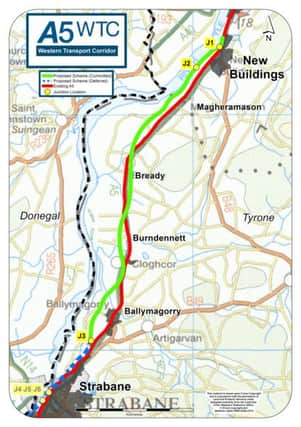A5 summary didn't match environmental statement: DRD


And it has now extended its consultation process until June prior to a full public inquiry later this year.
The huge infrastructure project has already been substantially delayed after a judge ruled a fuller assessment of the impact of the A5 proposals on the rivers Foyle and Finn Special Areas of Conservation (SAC) should have been carried out.
Advertisement
Hide AdAdvertisement
Hide AdNow DRD says it has become aware “the text of the Non-Technical Summary (which forms part of the Environmental Statement) does not fully reflect the content of the main body of the Environmental Statement.”
“While the content of the main body of the Environmental Statement, which comprises around 6,000 pages is unchanged, to ensure anyone who may only have read the shorter Non-Technical Summary is appropriately informed, it has been decided to re-consult on the Environmental Statement which includes a revised Non-Technical Summary.
This will allow for any further representations to be made but it should be noted that all those representations made during the initial consultation period remain valid and logged with the Department.”
The extended process will run from April 18, 2016 for a period of six weeks and formal notices, including information on how people can respond will be published next week. DRD also announced that public inquiries will be held later this year.
Advertisement
Hide AdAdvertisement
Hide AdThe consultation period on the draft statutory Orders and Environmental Statement for the A5WTC scheme closed on April 4, 2016. A total of 1,266 responses were received, including one petition of 400 signatories.
The Department will now be formally appointing the Planning Appeals Commission to hold these Public Inquiries which are expected to be held in autumn 2016.
A DRD spokesperson said: “Feedback from the public exhibitions held from 1 March through to 4 April 2016 was largely positive with a vast majority of those attending in support of the scheme.
“The Department has nevertheless received a significant number of representations on the proposals. Whilst the numbers are fewer than those submitted prior to the last public inquiries on the scheme the Department has concluded that all representations will need to be heard through a formal Public Inquiries process.”